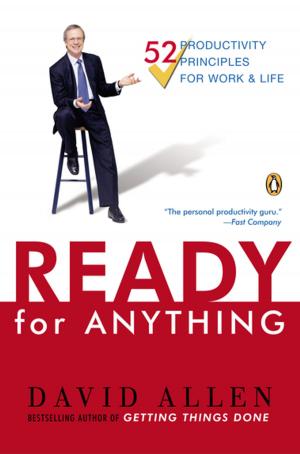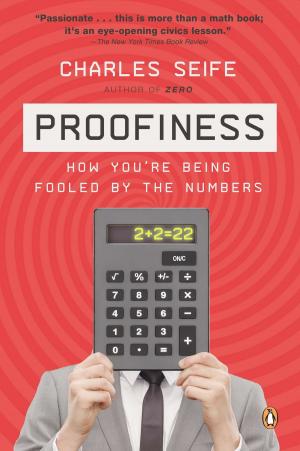Wake Up and Live!
A Formula for Success That Really Works!
Nonfiction, Health & Well Being, Self Help, Self Improvement, Success, Motivational| Author: | Dorothea Brande | ISBN: | 9781101620618 |
| Publisher: | Penguin Publishing Group | Publication: | September 12, 2013 |
| Imprint: | TarcherPerigee | Language: | English |
| Author: | Dorothea Brande |
| ISBN: | 9781101620618 |
| Publisher: | Penguin Publishing Group |
| Publication: | September 12, 2013 |
| Imprint: | TarcherPerigee |
| Language: | English |
**“Eminently sensible and practical.”– The New York Times Book Review
A true lost classic that can take your life to its fullest potential.** What if you were promised a simple, 8-word formula that could turn your life around? Would you believe it? Would you try it? Here it is:
Act as if it were impossible to fail
This magic key is at the heart of one of the most persuasive self-improvement books ever published – a work that, while forgotten, rivaled the popularity of contemporaneous books by Napoleon Hill and Dale Carnegie. It was called Wake Up and Live!, written by Dorothea Brande, an enterprising Chicago journalist.
When Brande published Wake Up and Live! in 1936, the book soared to popularity, selling over 1,000,000 copies in years ahead. The book won so much acclaim that it became the sole work of mind-power philosophy ever to make it to the movie screen – and as a musical, no less. In 1937, 20th Century Fox released Wake Up and Live, starring Walter Winchell.
Brande was a journalist and writing instructor by trade, best known for her enduring and thoughtful instructional book, Becoming a Writer (1934). That book, Brande explained, grew out of a period of bounding productivity in her career, which began with her discovery of one basic law of success. Brande’s formula was so simple and magical-seeming that it made people want to argue with her the moment she uttered it. But for many it worked.
Act as if it were impossible to fail.
Brande was a preternaturally sharp-eyed student of human nature. She detected among the vast majority of men and women a “will to fail.” This damning wish grew from a little-seen foible of human nature. We are, Brande insisted, more frightened of suffering humiliation than desirous of achievement. When fear and ambition clash, she argued, fear inevitably prevails. “The Unconscious dreads pain, humiliation, fatigue” Brande wrote; “it bends its efforts even more ceaselessly to the end of avoiding pain than it does to the procuring of positive pleasures.”
Rather than risk rejection, people often self-sabotage: blowing deadlines, alienating allies, aimlessly procrastinating. Brande’s grasp of the psychology of failure brought her a “eureka” moment. After a lifetime of searching she had found the answer.
Act as if it were impossible to fail.
In Wake Up and Live! – a book that is as enjoyable as its formula is simple – Brande tells the story of her discovery and shows how her eight-word technique can be applied across different areas of life. With its observations about self-defeat, and its powerful idea for navigating around it, Wake Up and Live! is one of the most keenly argued and carefully observant works of practical psychology ever written.
Praise for Wake Up and Live!
“Eminently sensible and practical.” – The New York Times Book Review
“A simple and usable technique of living…All I want to do is to buttonhole each and every one of my friends and say, ‘You must read Wake up and Live!’” – Jean Starr Untermeyer
“Fascinating and exactly the spring tonic that most of us need.” – Chicago Tribune
“She made her own test with sincerity and faith, and her entire life was changed to one of overwhelming success.” – Earl Nightingale, The Strangest Secret
**“Eminently sensible and practical.”– The New York Times Book Review
A true lost classic that can take your life to its fullest potential.** What if you were promised a simple, 8-word formula that could turn your life around? Would you believe it? Would you try it? Here it is:
Act as if it were impossible to fail
This magic key is at the heart of one of the most persuasive self-improvement books ever published – a work that, while forgotten, rivaled the popularity of contemporaneous books by Napoleon Hill and Dale Carnegie. It was called Wake Up and Live!, written by Dorothea Brande, an enterprising Chicago journalist.
When Brande published Wake Up and Live! in 1936, the book soared to popularity, selling over 1,000,000 copies in years ahead. The book won so much acclaim that it became the sole work of mind-power philosophy ever to make it to the movie screen – and as a musical, no less. In 1937, 20th Century Fox released Wake Up and Live, starring Walter Winchell.
Brande was a journalist and writing instructor by trade, best known for her enduring and thoughtful instructional book, Becoming a Writer (1934). That book, Brande explained, grew out of a period of bounding productivity in her career, which began with her discovery of one basic law of success. Brande’s formula was so simple and magical-seeming that it made people want to argue with her the moment she uttered it. But for many it worked.
Act as if it were impossible to fail.
Brande was a preternaturally sharp-eyed student of human nature. She detected among the vast majority of men and women a “will to fail.” This damning wish grew from a little-seen foible of human nature. We are, Brande insisted, more frightened of suffering humiliation than desirous of achievement. When fear and ambition clash, she argued, fear inevitably prevails. “The Unconscious dreads pain, humiliation, fatigue” Brande wrote; “it bends its efforts even more ceaselessly to the end of avoiding pain than it does to the procuring of positive pleasures.”
Rather than risk rejection, people often self-sabotage: blowing deadlines, alienating allies, aimlessly procrastinating. Brande’s grasp of the psychology of failure brought her a “eureka” moment. After a lifetime of searching she had found the answer.
Act as if it were impossible to fail.
In Wake Up and Live! – a book that is as enjoyable as its formula is simple – Brande tells the story of her discovery and shows how her eight-word technique can be applied across different areas of life. With its observations about self-defeat, and its powerful idea for navigating around it, Wake Up and Live! is one of the most keenly argued and carefully observant works of practical psychology ever written.
Praise for Wake Up and Live!
“Eminently sensible and practical.” – The New York Times Book Review
“A simple and usable technique of living…All I want to do is to buttonhole each and every one of my friends and say, ‘You must read Wake up and Live!’” – Jean Starr Untermeyer
“Fascinating and exactly the spring tonic that most of us need.” – Chicago Tribune
“She made her own test with sincerity and faith, and her entire life was changed to one of overwhelming success.” – Earl Nightingale, The Strangest Secret















